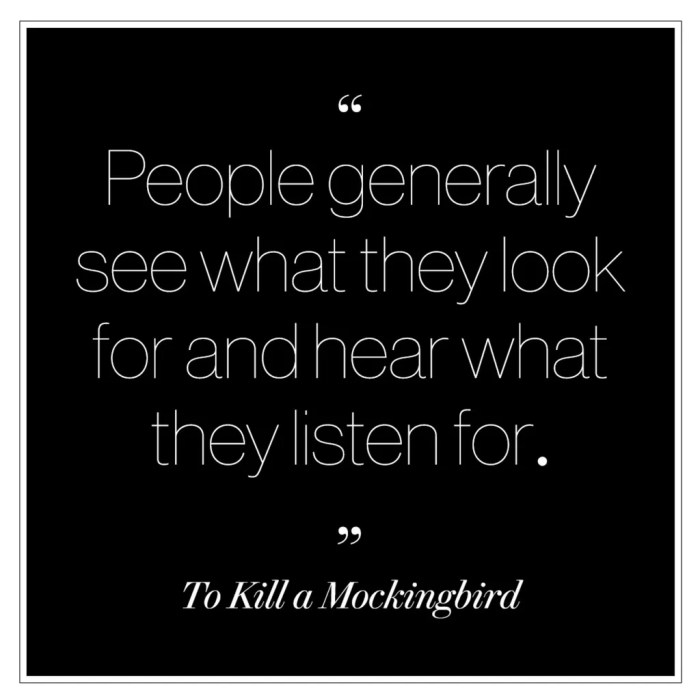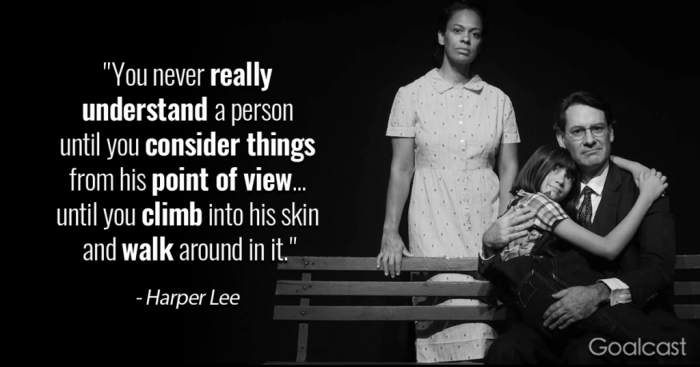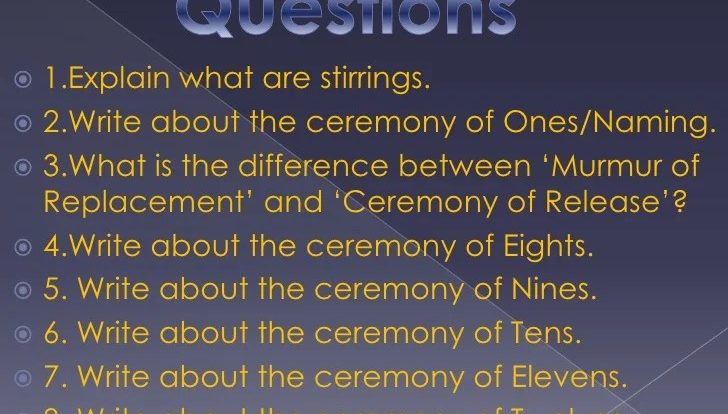Coming of age quotes in To Kill a Mockingbird resonate with readers of all ages, providing profound insights into the complexities of growing up, navigating social injustice, and developing a moral compass. This coming-of-age journey is vividly portrayed through the eyes of Scout Finch, a young girl whose experiences challenge her childhood innocence and shape her understanding of the world.
Harper Lee’s Pulitzer Prize-winning novel explores the coming-of-age themes through the lens of Scout’s perspective, the influence of mentors, the impact of social injustice, and the comparison of her experiences with her brother Jem. These elements intertwine to create a rich tapestry that captures the essence of growing up in the American South during the 1930s.
Coming-of-Age Themes in To Kill a Mockingbird

Harper Lee’s To Kill a Mockingbirdis a classic coming-of-age novel that explores the growth and maturation of its protagonist, Scout Finch. Through Scout’s perspective, the novel examines the complexities of childhood innocence, social injustice, and moral development.
Scout’s journey as a child narrator provides a unique lens through which readers witness the world of Maycomb, Alabama. Her childlike perspective allows her to observe and absorb the events of the novel with a fresh and unfiltered eye, highlighting the hypocrisy and prejudice that permeate society.
As Scout experiences the trial of Tom Robinson, her childhood innocence is shattered. She confronts the harsh realities of racism and the failure of justice. These experiences force her to question her beliefs and grapple with the complexities of the adult world.
Throughout the novel, Scout demonstrates significant growth and maturity. She learns the importance of empathy, compassion, and standing up for what is right. Her relationships with Atticus, Miss Maudie, and Calpurnia shape her moral development and help her navigate the challenges of adolescence.
Mentors in Scout’s Coming-of-Age Journey, Coming of age quotes in to kill a mockingbird
Atticus Finch serves as a pivotal mentor for Scout. His unwavering commitment to justice and his belief in the inherent dignity of all people inspire Scout and guide her moral development. He teaches her the importance of critical thinking, empathy, and courage.
Miss Maudie Atkinson is a strong and independent female role model for Scout. Her wisdom, kindness, and unwavering support provide Scout with a sense of security and belonging. She encourages Scout to embrace her individuality and to challenge societal norms.
Calpurnia, the family’s African American cook, plays a crucial role in Scout’s understanding of race and class. Her wisdom and resilience help Scout to confront the realities of racial inequality and to develop a deep appreciation for the contributions of the black community.
Social Injustice and Scout’s Coming-of-Age
The trial of Tom Robinson is a pivotal event in Scout’s coming-of-age. It exposes her to the systemic racism and prejudice that exist in her society. The injustice of Tom’s conviction forces her to question her faith in the justice system and to confront the complexities of race relations.
Boo Radley, the mysterious neighbor, challenges societal norms and serves as a symbol of hope and resilience. His kindness and compassion towards Scout and Jem undermine the prejudices that have isolated him from the community.
The lynching of Tom Robinson marks a turning point in Scout’s development. It solidifies her understanding of the horrors of racism and the fragility of justice. This event forces her to confront the harsh realities of the adult world and to embrace her role as an advocate for justice.
Coming-of-Age Experiences of Scout and Jem
Scout and Jem’s coming-of-age experiences are both similar and distinct. They share a sense of adventure and a thirst for knowledge. However, their perspectives and experiences are shaped by their different genders and ages.
Scout’s perspective as a girl allows her to observe and experience the world in a unique way. She is able to challenge societal norms and to develop a strong sense of independence.
Jem’s perspective as a boy provides him with a different set of experiences and challenges. He is expected to be strong and courageous, and he often struggles to reconcile his own desires with the expectations of society.
Despite their differences, Scout and Jem’s shared experiences help them to develop a strong bond and a shared moral compass.
Key Coming-of-Age Quotes from To Kill a Mockingbird
| Quote | Character | Context | Significance |
|---|---|---|---|
| “You never really understand a person until you consider things from his point of view… Until you climb into his skin and walk around in it.” | Atticus Finch | Explaining the importance of empathy | Emphasizes the need for understanding and compassion |
| “I think there’s just one kind of folks. Folks.” | Scout Finch | Expressing her belief in the inherent equality of all people | Challenges racial prejudice and promotes inclusivity |
| “Courage is not about not being afraid, it’s about doing what you’re afraid of.” | Atticus Finch | Encouraging Scout to face her fears | Promotes resilience and the importance of overcoming adversity |
| “You can’t judge a book by its cover.” | Miss Maudie Atkinson | Advising Scout not to make assumptions based on appearances | Emphasizes the importance of looking beyond superficial qualities |
| “It’s a sin to kill a mockingbird.” | Miss Maudie Atkinson | Explaining the importance of protecting innocence and vulnerability | Conveys the need for compassion and kindness towards others |
| “The one thing that doesn’t abide by majority rule is a person’s conscience.” | Atticus Finch | Defending Tom Robinson in court | Highlights the importance of individual integrity and moral principles |
| “I wanted you to see what real courage is, instead of getting the idea that courage is a man with a gun in his hand. It’s when you know you’re licked before you begin, but you begin anyway and you see it through no matter what.” | Atticus Finch | Explaining true courage to Scout | Redefines courage as perseverance and determination |
| “You’re not going to win him, you’re going to lose him, but I thought you should know why.” | Miss Maudie Atkinson | Advising Scout about Boo Radley | Highlights the importance of accepting people for who they are |
| “We’re going to win this case, Scout. Not because we’re so smart, but because we’re so right.” | Atticus Finch | Encouraging Scout to believe in justice | Inspires hope and optimism in the face of adversity |
| “There are some men in this world who are born to do our unpleasant jobs for us. Your father’s one of them.” | Miss Maudie Atkinson | Praising Atticus’s moral integrity | Recognizes the importance of individuals who stand up for justice |
Detailed FAQs: Coming Of Age Quotes In To Kill A Mockingbird
What is the significance of Scout’s perspective as a child narrator?
Scout’s perspective as a child narrator provides a unique and authentic lens through which readers experience the events of the novel. Her innocence and curiosity allow her to observe and question the world around her, leading to a deeper understanding of the complexities of human nature and society.
How do Scout’s experiences challenge her childhood innocence?
Scout’s experiences throughout the novel confront her with the harsh realities of life, challenging her childhood innocence. Witnessing the prejudice and injustice faced by Tom Robinson and Boo Radley forces her to question her assumptions about the world and the people in it.
What is the role of Atticus Finch in Scout’s moral development?
Atticus Finch serves as a moral compass for Scout, guiding her through the complexities of right and wrong. His unwavering commitment to justice and equality inspires Scout to develop her own strong moral values and to stand up for what she believes in.





